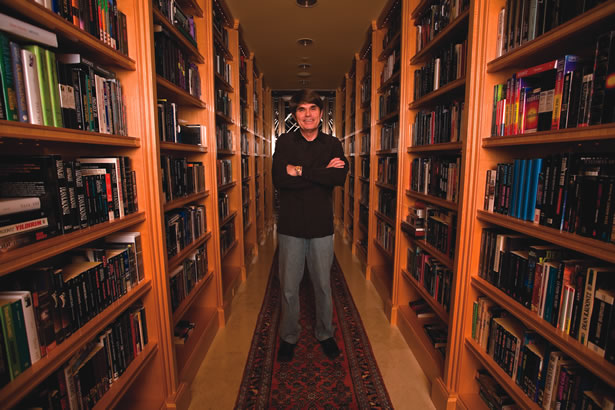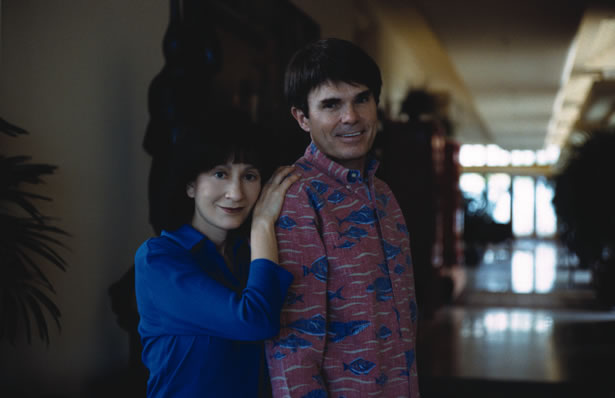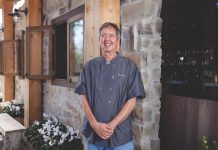As he walks through his impressive home library, Dean Koontz brushes the spines of his favorite books with obvious affection.
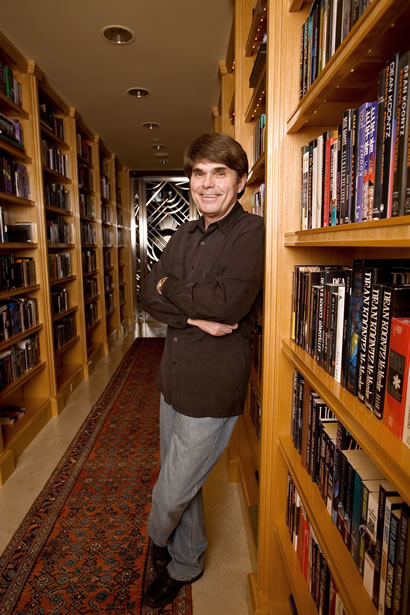 “This is the first place in my life where I’ve felt at home,” the best-selling author says of his Newport Beach home, where he has lived for more than a decade.
“This is the first place in my life where I’ve felt at home,” the best-selling author says of his Newport Beach home, where he has lived for more than a decade.
A global phenomenon, Dean Koontz is a prolific writer who has sold more than 400 million copies of his books, which have been translated into 38 languages. Although often labeled as horror, his novels are perhaps better described as suspense thrillers that incorporate elements of supernatural, mystery, science fiction and satire. Dean enjoys the success of which most writers only dream, with 12 of his novels having reached the coveted No. 1 slot on the New York Times hardcover best-seller list.
A man of routine, Dean wakes up before 6 a.m. every day, takes his beloved golden retriever Anna for a walk, grabs a light breakfast and peruses the financial papers. Then he writes straight through until dinner, rarely stopping for lunch.
Inside his office, he worries aloud about excessive dust, but his workspace is immaculate. He explains that he’s been working hard to meet the deadlines for his latest novel, “What the Night Knows” (Bantam Books), “an unusual ghost story” which hits stores on Dec. 28.
On his spotless desk sits an 18-year-old computer on which Dean writes two or more best-sellers every year. It doesn’t have a modern word processor—in fact, it came with Windows, but he had it removed—and the screen flickers with luminous green text that evokes a fantastical image of Rod Serling penning scripts for “The Twilight Zone.”
“The only thing that interrupts writing is the business part of writing,” Dean says. “I didn’t have e-mail until two and a half years ago, and still don’t know how to send or receive one. I have no desire to learn it because I’ve seen writer friends who spend hours on it. I’m never going to do that. I don’t have time enough as it is.”
From East to West
Every detail of the Koontz’s impressive house reflects the meticulous nature of its occupants, Dean and Gerda, his wife of 44 years.
“I grew up in a home that didn’t have indoor plumbing until I was 11,” he says. “So having a house was always important to me.”
Dean speaks candidly on any subject posed to him, from religion and politics to the hair transplants that have restored his youthful appearance. Born in Pennsylvania in 1945, Dean’s childhood was overshadowed by a violent, alcoholic father, Ray, who was later diagnosed as a sociopath. Whatever small amount of money Ray made over the course of 44 jobs in 33 years went to illicit affairs, booze and gambling.
“The first time I mentioned that, people thought I had an unrelentingly grim childhood,” Dean says, with the hint of a smile. “But that really isn’t the case. While there was a lot that wasn’t wonderful, I always found something that made me happy.”
If anything, his chaotic youth left him hyper-motivated to succeed. “I’m not so sure I would have had the career I have without my father,” he elaborates. “He showed me everything that I shouldn’t do.”
Dean also credits a tough-but-sweet high school teacher—formerly a member of the Women’s Army Corps in World War II—for pushing him in to an English program at Shippensburg University in Pennsylvania. If not for Winona Garbrick rapping Dean over the head with a high-school grammar textbook, he might have become a history professor.
“I was a kid that nobody paid any attention to, except that I was the class clown,” he says. “But I didn’t have a lot in the way of a mentor. I was so impressed that this teacher cared enough about me that I changed my major. I may have become a writer eventually, but I would have never done it so quickly.”
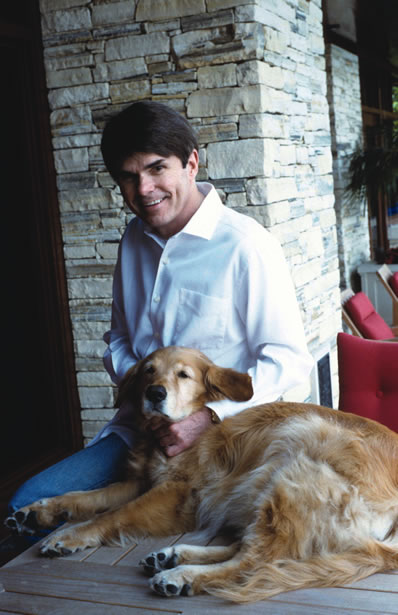 When his short story “The Kittens” won an award from the Atlantic Monthly magazine in 1966, Dean got the first glimpse of the writing successes that would follow. He graduated from college in 1966, the same year he married Gerda. Dean wrote science-fiction short stories and sold them to magazines while teaching high school English in Mechanicsburg, Pa. He had written two or three novels—which didn’t sell—when Gerda surprised him by offering to subsidize his writing for five years. “I tried to bargain her up to seven years,” he recalls fondly, “but she has Sicilian blood in her so I wasn’t going to win that one.” Three months later, Dean sold his first novel, an epic science-fiction adventure story called “Star Quest,” which was published in 1968.
When his short story “The Kittens” won an award from the Atlantic Monthly magazine in 1966, Dean got the first glimpse of the writing successes that would follow. He graduated from college in 1966, the same year he married Gerda. Dean wrote science-fiction short stories and sold them to magazines while teaching high school English in Mechanicsburg, Pa. He had written two or three novels—which didn’t sell—when Gerda surprised him by offering to subsidize his writing for five years. “I tried to bargain her up to seven years,” he recalls fondly, “but she has Sicilian blood in her so I wasn’t going to win that one.” Three months later, Dean sold his first novel, an epic science-fiction adventure story called “Star Quest,” which was published in 1968.
They lived in the state capital of Harrisburg, Pa.— a city for which Dean holds little affection—for nine years. After 40 days and 40 nights of gray, wet weather that Dean describes as “very Biblical,” he and Gerda moved west in search of sunshine. After a year in Las Vegas and six years in Orange Park Acres, an exclusive community in the city of Orange, they landed in Newport Beach.
“One of the things I love about Newport Beach is that we’ve been able to make so many friends here,” he says. He takes a sip from a can of soda and smiles. “They’re often people who grew up as poor as we were. They found something they did well, and then turned it into something. We’d go to a party and meet self-made millionaires and school teachers. There wasn’t that stratified class system you have everywhere back east. That impressed us a lot, how easily different kinds of people mixed out here.”
California’s cultural melting pot is a recurring motif in Dean’s novels. “Fear Nothing” and “Seize the Night”—which are both set on the central California coast—feature a colorful minor character, the surfer Bobby Halloway. “Ticktock” also draws on California’s rich and diverse culture. It features Tommy Phan, a Vietnamese-American man who is haunted by a mysterious rag doll with nefarious intentions.
“I find California infinitely diverse and interesting,” Dean explains. “It’s got a great element of romance about it.”
He is equally intrigued by local environmental factors and how they play out in the area’s collective subconscious. “I find it fascinating that we live on such unstable ground, and how little people actually let themselves think about it,” he says. “The weather is the same. People act differently than people who live in more difficult weather. People are more open out here.”
The Write Stuff
Out of his illustrious catalogue, Dean has a few personal favorites. He mentions two of his earliest blockbusters: “Watchers”—which features a remarkably intelligent golden retriever modeled after Trixie, his beloved family dog that passed away several years ago—and “Lightning,” which he considers a terrific challenge because of the complex time travel rules he had to invent. And he describes the eponymous first novel in the “Odd Thomas” series as coming entirely from a “floe state,” in which it was like he “wasn’t even writing it.”
Another favorite—and perhaps Dean’s most ambitious novel—is “From the Corner of His Eye,” a complex tapestry of stories inspired by an article in a science journal detailing Einstein’s “spooky action at a distance”—one of the fundamental paradoxes of quantum mechanics—in which one object influences another, at a distance yet instantaneously.
It’s counterintuitive and yet inspiring to realize that the master storyteller, at this stage of his career, hasn’t got it all figured out.
“It gets harder all the time,” Dean says. “When I was starting out, I thought, 10 books and I’ll have learned all the tricks, and then it’ll be easy. Of course what happens is that you want to try new things. You say, ‘I wonder if I could get away doing this?’ Then you find out that you probably can, and you’re going to have to work harder. That’s what keeps you going.”
Home on the Coast
Dean is a somewhat of a homebody—and understandably so, based on his impressive house.
When the Newport Coast development took shape in the early ’90s, Dean was quick to snap up four prime lots, on which he built his dream home from the ground up. Nestled on the Newport Coast hillside, the 26,000-square-foot estate took eight years to complete.
Standing in his library, Dean stops to highlight the expert craftsmanship of the wood shelves that hold his precious books. He goes on to chronicle how he and his wife Gerda came across a Tiffany lamp at an antique show in Los Angeles. “You don’t have to chase all over the world to find wonderful things,” he says sagely. “You just have to be patient.”
Patience is exactly what it took for Dean and Gerda to build their home. The Koontz’s home boasts two swimming pools, numerous garden terraces, a full bar, a sub-basement garage and a full-time staff. The interior is an elaborate art deco design, with furniture characterized by European and Asian accents. An impressive painting by R. Kenton Nelson—of elegant and quintessentially Californian characters—hangs prominently on the anagray wood wall that leads into the main living room. And on the lower level, there is a movie theater named the “Moonlight” in honor of the drive-in theatre that Dean and Gerda frequented as high-school sweethearts in the small town of Everett, Pa.
“This house is over-the-top, but it works for us,” Dean says. “It’s everything we like.”
Inspiring Friends
Longtime fans of Dean Koontz are familiar with Trixie, the family dog that for many years appeared next to him on the back-cover photos. In various guises, Trixie made her way into several manuscripts, and Dean periodically writes children’s books starring his cherished golden retriever. When she passed away a few years ago, it was a devastating loss to Dean and his wife Gerda. “We knew it was going to be rough, but I think the depth of the grief surprised both of us,” he says.
Trixie was a graduate of Canine Companions for Independence (CCI), an organization that provides highly-trained assistance dogs for children and adults with disabilities, free of charge. “They do incredible things,” Dean says, who has a framed picture of Trixie on his desk. Dean and Gerda adopted Trixie when she developed an elbow problem and was no longer able to serve. “We’ve been to [CCI] graduations,” he continues. “It just rips you up, but it’s not a sad thing.”
Dean calls his ongoing association with CCI “spiritually rewarding.” He modestly refrains from mentioning the frequent, generous donations he makes to the organization. In his novels, Dean was one of the first writers to portray vivid, three-dimensional characters with disabilities—people who were not defined entirely by their handicaps. “By the Light of the Moon,” for example, features an autistic man in a wild story of plunging danger.
“I admire them enormously,” he says of the people he’s met through CCI. “Indomitability is required when you’ve been dealt a hand like that.”
It took eight months for Dean and Gerda to decide they were ready to adopt another dog. Two months later they picked up Anna from CCI. Anna, also a golden retriever, was discharged from the program because the CCI trainers could not break her from becoming distracted around birds. “She walked in and we looked at her and got verklempt,” he recalls. “I thought it was just us being sentimental fools.”
In a strange twist that seems like it came straight out of one of Dean’s novels, he later discovered that Anna’s great-aunt was his beloved Trixie.


